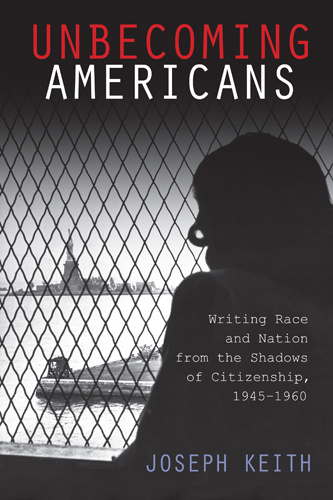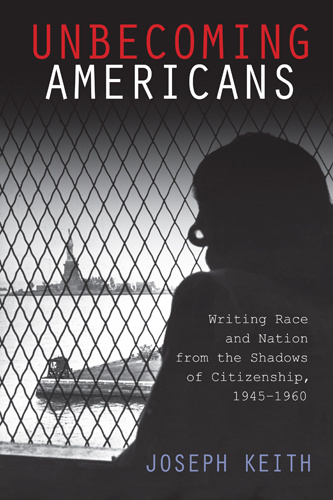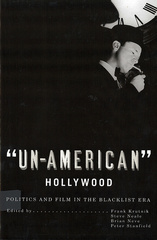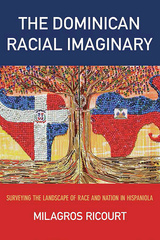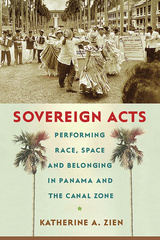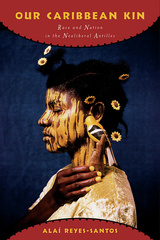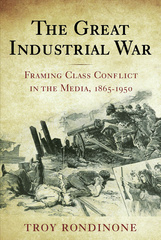Unbecoming Americans
Writing Race and Nation from the Shadows of Citizenship, 1945-1960
During the Cold War, Ellis Island no longer served as the largest port of entry for immigrants, but as a prison for holding aliens the state wished to deport. The government criminalized those it considered un-assimilable (from left-wing intellectuals and black radicals to racialized migrant laborers) through the denial, annulment, and curtailment of citizenship and its rights. The island, ceasing to represent the iconic ideal of immigrant America, came to symbolize its very limits.
Unbecoming Americans sets out to recover the shadow narratives of un-American writers forged out of the racial and political limits of citizenship. In this collection of Afro-Caribbean, Filipino, and African American writers—C.L.R. James, Carlos Bulosan, Claudia Jones, and Richard Wright—Joseph Keith examines how they used their exclusion from the nation, a condition he terms “alienage,” as a standpoint from which to imagine alternative global solidarities and to interrogate the contradictions of the United States as a country, a republic, and an empire at the dawn of the "American Century.”
Building on scholarship linking the forms of the novel to those of the nation, the book explores how these writers employed alternative aesthetic forms, including memoir, cultural criticism, and travel narrative, to contest prevailing notions of race, nation, and citizenship. Ultimately they produced a vital counter-discourse of freedom in opposition to the new formations of empire emerging in the years after World War II, forms that continue to shape our world today.
Its overall value lies in its nuanced attention to how an outsider status can function as a corrective to US exceptionalism and engender a mode of resistance. [Unbecoming Americans] is not only timely—it is academically significant and politically germane.
Unbecoming Americans is a valuable addition to the study of mid-century and Cold War American culture, as it reveals to us in new ways how political history and literary form intersect at the dawn of the American century.
Keith has engaged an interesting topic that literary and cultural studies scholars will savor.
Unbecoming Americans provides a sophisticated synthesis of disparate texts, highlights the significance of discursive critique during the early years of the Cold War, and encourages scholars to investigate other neglected works in search of both alternative perspectives of social discourse and alternative conceptions of the social itself.
A compelling book. Unbecoming Americans is built on the hope that reading, language, and form have the subversivepotential to promote new ideas.
A highly original work that is grounded in compelling literary and historical analysis. Unbecoming Americans illuminates Cold War America and U.S. critical race theory with insights drawn from subaltern historiography and postcolonial theory.
Joseph Keith compellingly demonstrates how a select group of authors fashioneda radical cosmopolitan literary tradition at the subaltern limits of U.S. citizenship that subverted racial logics, reimagined the state, and addressed the question of 'how shall the human race be organized?'
This is a great book, valuable for the light it sheds on a little known period in American literary history as well as for the way it rereads these texts. For students of narratives, official and otherwise, it is a compelling reminder of how stories function as the scaffolding on which we build our understandings.
This is a great book, valuable for the light it sheds on a little known period in American literary history as well as for the way it rereads these texts. For students of narratives, official and otherwise, it is a compelling reminder of how stories function as the scaffolding on which we build our understandings.
Joseph Keith compellingly demonstrates how a select group of authors fashioneda radical cosmopolitan literary tradition at the subaltern limits of U.S. citizenship that subverted racial logics, reimagined the state, and addressed the question of 'how shall the human race be organized?'
A highly original work that is grounded in compelling literary and historical analysis. Unbecoming Americans illuminates Cold War America and U.S. critical race theory with insights drawn from subaltern historiography and postcolonial theory.
A compelling book. Unbecoming Americans is built on the hope that reading, language, and form have the subversivepotential to promote new ideas.
Unbecoming Americans provides a sophisticated synthesis of disparate texts, highlights the significance of discursive critique during the early years of the Cold War, and encourages scholars to investigate other neglected works in search of both alternative perspectives of social discourse and alternative conceptions of the social itself.
Keith has engaged an interesting topic that literary and cultural studies scholars will savor.
Unbecoming Americans is a valuable addition to the study of mid-century and Cold War American culture, as it reveals to us in new ways how political history and literary form intersect at the dawn of the American century.
Its overall value lies in its nuanced attention to how an outsider status can function as a corrective to US exceptionalism and engender a mode of resistance. [Unbecoming Americans] is not only timely—it is academically significant and politically germane.
JOSEPH KEITH is an assistant professor of English at Binghamton University, SUNY.
Introduction: Shadow Narratives of the Transnational
Part I. Novel Forms: Writing at the Limits of Citizenship
1. Neither Citizen nor Alien: Rewriting the Immigrant Bildungsroman across the Borders of Empire in Carlos Bulosan's America Is in the Heart
2. The Epistemology of Unbelonging: Richard Wright's The Outsider and the Politics of Secrecy
Part II. Peripheral Forms: Literatures of Alienage, Incarceration, and Deportation
3. Richard Wright's Cosmopolitan Exile: Race, Decolonization, and the Dialogics of Modernity
4. The Undesirable Alien and the Politics of Form: Telling Untold Tales in C. L. R. James's Mariners, Renegades, and Castaways
5. Talking Back to the State: Claudia Jones's Radical Forms of Alienage
Conclusion: An Empire of Alienage
Notes
Index

